Tuesday Feb 17, 2026
Tuesday Feb 17, 2026
Tuesday, 2 March 2021 02:33 - - {{hitsCtrl.values.hits}}
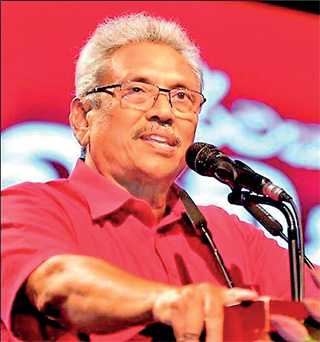
President Gotabaya Rajapaksa
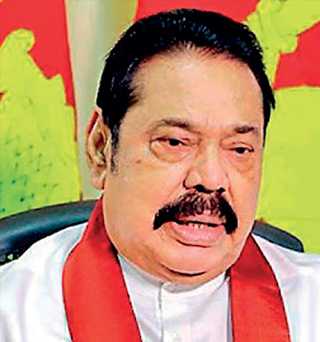
Prime Minister Mahinda Rajapaksa
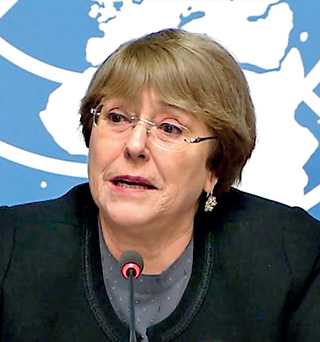
UN High Commissioner for Human Rights Michelle Bachelet
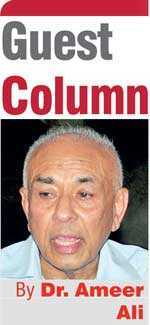 At last, after nearly 12 months of agony and trauma, and close to 350 forced cremation of corona-killed Muslims, President Gotabaya Rajapaksa had relented and issued a gazette notification restoring a controversially lost Muslim human right.
At last, after nearly 12 months of agony and trauma, and close to 350 forced cremation of corona-killed Muslims, President Gotabaya Rajapaksa had relented and issued a gazette notification restoring a controversially lost Muslim human right.
The Muslim community would indeed have a great sigh of relief, and there may be several among them, who would claim credit for this so-called achievement, including the five parliamentarians, who treacherously voted in favour of the 20th Amendment.
What made Rajapaksa and his coterie of monks and advisors change their mind? To start with, the initial decision to cremate all corona-killed bodies was based on an untested and speculative argument that the virus would spread to humans through contaminated underground water if the said bodies were to be buried. It was music to the ears of Islamophobes on whose support NGR and MR’s Government stay in power. Sheer speculation in combination with ethno-religious hatred of minorities defied all contrary views and advice from WHO, international human right groups, local and foreign intellectuals, and above all, internationally renowned experts on epidemiology.
Four events of significance
However, four things happened one after the other and compelled the regime to rethink. The most significant of these was the damning report by the UN High Commissioner for Human Rights, Veronica Michelle Bachelet, which was released on 27 January 2021. That report picked among other issues the one pertaining to forced cremation of corona-killed Muslims and argued that it deprived that community one of its basic human rights. It is now a subject of discussion in Geneva at the UNHCR Council.
The second event happened on 3 February 2021, when Tamils and Muslims marched from Pottuvil in the East to Polikandy in the north demanding justice, equality of status and freedom from oppression. The spontaneity of that alliance between the two minorities must have sent an important message to Rajapaksa and his regime that the hackneyed tactic of divide and rule has passed its use by date. Life under this regime has become so deplorable and unbearable to minorities that they had no alternative but to revolt. It is a matter of time even the majority would feel the same if situation in the country continues to worsen under this regime.
The third event happened a week later on 10 February in the Legislature, when Prime Minister Mahinda Rajapaksa responded to a question from a Muslim member and said that burials would be permitted. However, he stopped sort of clearing the air by not specifying whether he meant the burial of corona-killed Muslims. Being an old fox in politics, and realising the danger of growing international pressure over this issue he might have said it to measure the pulse of his supporters and their reaction. That reaction was negative and almost instantaneous when one of his own ministers contradicted him. After that MR went quiet.
The final event was Imran Khan’s (IK) two-day visit to Colombo on 23 February. With regard to the cremation/burial issue this was a non-event, although to the less discerning it may look as if NGR had relented to please his guest.
IK visit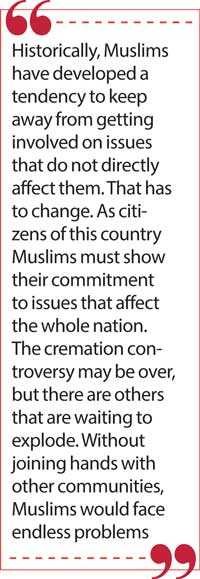
For centuries, Sri Lankan Muslims were made to believe by their religious leaders, politicians and public speakers that their community is part of a universal Muslim family or umma, which now accounts for nearly one-fifth of humanity. This universal family has 57 Muslim majority countries, and all of them are members of an ineffective Organization of Islamic Countries (OIC), or more appropriately, Oh I see.
Although the Sri Lankan members of this family are a small minority, they were told, as one of their political leaders did recently, that the supranational solidarity built on the edifice of Islam is a God-given strength and will be a protector to Muslim minorities in times of crisis.
In fact, Muslims the world over were fed with this canard, but the reality is otherwise. With the disappearance of the Ottoman Caliphate followed by European penetration, conquest and colonisation of Muslim lands, and with the growth of secular nationalism, the idea of a supranational umma had given way to the emergence of watan or nation, and the spirit of nationalism superseded the spirit of Islamic unity and Muslim brotherhood.
When IK expressed his concerns over forced cremation, and felt elated later when MR provided that vague response in the Parliament, Muslims believed that supranational solidarity has relevance and is working for their benefit. Yet, when he did not mention even a word about this issue when he was in the country all expectations were dashed and the community felt utterly disappointed.
One cannot blame IK for this, because the primary purpose of his visit was to strengthen the China-Pakistan Economic Corridor (CPEC) of the One Belt Road by bringing in Sri Lanka into it and make it a China-Pakistan-Sri Lanka Economic Corridor (CPSLEC). All MOUs that he signed in Colombo was to achieve this objective. He was therefore not going to jeopardise the strategic partnership with Sri Lanka and China by rekindling the cremation issue.
Moreover, how indifferent is IK towards the plight of Muslims outside his own country is best demonstrated by his prolonged silence on the plight of Uighurs in China. The same accusation could be levelled against Rajapaksa who also has not shown any sympathy towards the sufferings of Tibetan Buddhists under Chinese occupation. Both these leaders do not want to anger their Chinese paymaster.
To local Muslims however, this is a stark reminder not to build any hope on supranational solidarity. If this solidarity has any meaning today, Palestinians would have had their country long time ago, Rohingyas would not have been killed, raped and expelled from Myanmar, and Uighur Muslims would not have to endure what they are going through now in hundreds of Chinese brainwashing camps.
P2P
The Pottuvil to Polikandy pedestrian march was an eye-opener to anti-minority hardliners in the Government. It was spontaneous and the participants ignored all legal and security hurdles erected by the authorities and they did not support any political party or movement. All they did was to raise their voice against continuing injustice and oppression. Tamils and Muslims decided to ignore their past differences and became united as one family of victims.
P2P obviously sent a clear warning to the NGR and MR Government that it is a matter of time before even the majority community would organise such a march if the current crises are not tackled systematically. The country’s economy is in tatters, ecosystem ruined, foreign policy bungled, sovereignty compromised and people’s living conditions plummeted.
MR’s politics
Mahinda Rajapaksa is a veteran in parliamentary politics unlike NGR, who only knows how to command and enforce. MR chooses the right words and messages when he visits Tamil and Muslim areas and is a master in the art of divide and rule. He is aware of the dangerous direction in which his Government is heading because of the stranglehold Buddhist supremacists have over Government policies and implementation.
It was as President that MR declared in 2009 after winning the war that there would be no more Sinhalese, Tamils or Muslims in this country but only Sri Lankans. Today, he is the Prime Minister of a Government that caters mostly if not only to the needs of the Sinhala majority and that too to its Buddhist sector. Therefore, it is reasonable to assume that his response in the Parliament to a question on Muslim burial was a politically calculated move to see whether he could initiate a change in the mentality of hardliners.
UNHCR
However, the real credit for NGR’s gazette notification should go to Bachelet’s report which is now being debated in Geneva. Muslims have no one else to thank but this brave lady, who has her own experience of living under a military regime in which her father was killed. Her report has forced the hands of the President and his government to give back to Muslims the right taken away from them.
By relenting on this issue NGR and MR must have managed to convince their hardliner monks and members of NGR’s Viyathmaga that a new and reformist face need be shown to the world if the regime were to escape from Geneva with minimum damage. The President’s gazette notification is yet to be put into action.
Muslims in the aftermath
Having got their right restored, how will the community plan its future? Although the final push came from outside, the community should not underestimate the domestic pressure exerted by local civil right groups, compassionate members of the Sangha, Christian prelates, Tamil leaders and secular rationalists. To Muslims, that implies that the battle for democracy, justice, equality and freedom must be fought and won internally and jointly with other communities.
Having lived for over 1,000 years with no fundamental issues and quarrels with fellow communities, why did relations suddenly turn so sour in recent times? This question was repeatedly discussed in previous contributions to this journal, which need no repetition here. What was said in essence was that the Muslim community, without realising the long-term consequences, began entertaining ideas that led to self-alienation in the name of protecting its religious and cultural identities. That self-alienation, because of its incompatibility with the dynamics of pluralism, eventually led to isolation and ultimately to rejection by others.
What is needed therefore is a new strategy to seek solidarity with the growing forces of domestic opposition that run right through all communities at the moment. Unfortunately, the opposition has a strong distrust of Muslims, because of the treacherous behaviour of their political leaders. The Muslim community would not have been driven to this tragic situation and forced to endure the agony and horrors of cremation, had its political representatives not voted for the 20th Amendment. It was a treachery of unfathomable depth with unimaginable consequences.
To save the community from further disaster, the entire Muslim leadership should be rejected as a first step and at the earliest possible opportunity, and replaced by a new team of Muslim men and women, who would identify themselves not primarily as Muslims but as citizens, join a broad coalition of Buddhists, Christians and Hindus, and make future struggles a joint one.
Historically, Muslims have developed a tendency to keep away from getting involved on issues that do not directly affect them. Regretfully, this tendency has a religious root, which will be a subject for another discussion. Civil societies in the country also have a perennial complaint against the community on this matter. That has to change.
As citizens of this country Muslims must show their commitment to issues that affect the whole nation. When other communities and organisations organise events to highlight such issues Muslims should be part of such events. The cremation controversy may be over, but there are others that are waiting to explode. Without joining hands with other communities, Muslims would face endless problems, especially under this regime.
(The writer is attached to the School of Business & Governance, Murdoch University, Western Australia.)